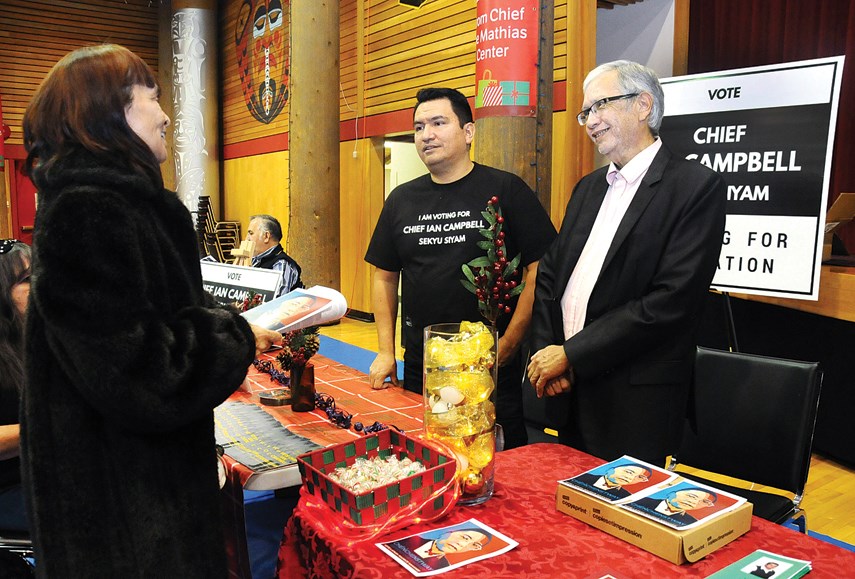A housing crisis that’s pushing people out of the community. The need for “big picture” economic prosperity to be felt in everyday lives. A call for greater transparency from decision makers and electoral reform.
They sound like provincial issues, but they’re also among key topics on the minds of candidates for the Squamish Nation election, which takes place this coming Sunday, Dec. 10.
A total of 59 band members are running for 16 council positions, who will hold those positions for a four-year team. Seven candidates are also running for the elected position of band manager.
Thirteen of those running for council are incumbents, including several who have held those positions for multiple terms. Those candidates are emphasizing the need for experienced leadership as the nation tackles major issues ranging from court challenges of the Kinder Morgan pipeline expansion, negotiations over the Woodfibre LNG project in Howe Sound and future development of the Jericho lands to provide future economic development.
But there are also candidates challenging the status quo, who say the band leadership has not consulted the membership or communicated about many big decisions.
They argue ordinary band members aren’t sharing in the nation’s wealth and are being pushed off the reserve because of lack of housing.
Dustin Rivers, an activist who also goes by the name Khelsilem, is one of the challengers running for council. He is one of those asking voters to cast ballots in favour of a “new nine”: younger candidates who have never been on council. “It’s really about the direction of council,” he said, pointing out that nine people hold the balance of power on a 16-member board.
Rivers said the band council could make simple changes to become more accessible to members – like posting agendas ahead of meetings and minutes afterwards and even live-streaming council meetings. “All of these things are basic in any other government,” he said.
Rivers was also part of a commission on electoral reform which recommended changes like campaign finance rules and mail-in votes for off-reserve members of the nation. Rivers said he’d like to see those recommendations adopted by the incoming council.
Ian Campbell, a hereditary chief and incumbent councillor who has been the spokesman for the Squamish Nation for two terms, said he agrees that better communication with band members is important.
But Campbell said the nation is also wrestling with large issues, like the need to increase revenue streams, where experience counts.
“We’re building partnerships. We’re attracting investment,” he said. “We need tested leadership.”
Development of the Jericho lands alone could see billions of dollars flow into band coffers, he said. “There’s a lot to be celebrated. Now we need to bring it across the finish line.”
Clarissa Antone is another challenger running for council, saying the band government lacks accountability.
Antone said she’s one of very few band members who have actually attended council meetings.
“If you want to be a council member you need to have been to a meeting or at least know what’s going on,” she said.
But Antone said she still finds herself making freedom-of-information requests to the Department of Indian and Northern Affairs to get information that should be readily available to band members.
Beverly Brown, another candidate, lives off-reserve in Maple Ridge, and says there needs to be a voice for off-reserve members at the council table.
More people are being forced into that position because of a housing crisis on Squamish Nation lands, she said.
“We have housing issues in the general public. It’s the same thing on reserve but worse. We don’t have enough houses for our people.”
Brown says the council should be concentrating on that instead of on developing lands for non-native housing.
A number of candidates are advocating building more dense housing like townhouses and apartments for members, rather than single-family homes.
There are 2,956 registered Squamish Nation voters among a total membership of 4,047. About half the membership live on reserve lands while half don’t.
During the last election in 2013, a total of 1,283 ballots were cast.
Last year the council oversaw a budget of $87 million, of which $17 million came in transfer payments from the federal government, $22 million was from leases, $16 million was from land and resource accommodation agreements with government, and $10 million was from taxation. Revenue also included money from numerous business partnerships the Squamish Nation is involved in.
The nation spent approximately $51 million on programs, including $9 million on child and family services.



